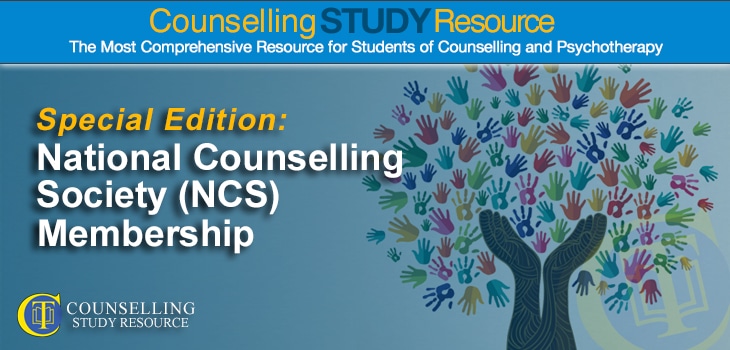Special Edition – National Counselling Society Membership
We broadcast a special edition podcast on the National Counselling Society (NCS) in March 2019. This followed questions posed by members of the Counselling Tutor Facebook group.
Rory now revisits the NCS with more questions gathered from the Facebook group, and speaks to NCS Chief Executive Meg Nunn. Meg answers a range of questions, which we list here, with some of the information she provided. To hear Meg’s full answers, please listen to the podcast.
What is the history of the NCS?
Originally known as the Counselling and Psychotherapy Society, the organisation was started in the mid-1990s by a group of counsellors, psychotherapists, hypnotherapists and psychologists who wanted an alternative to the other professional bodies available at that time.
What makes the NCS different from other professional bodies?
Meg sees the NCS’s key difference as being its grassroots origin and member-led ethos.
What are the benefits of having a choice of professional bodies?
It’s good to be able to choose between different bodies, as counsellors and psychotherapists themselves are a naturally diverse group, with a wide range of perspectives, modalities, personal politics and spiritual beliefs.
Does the NCS offer an Accredited Register?
Yes, the NCS’s register is accredited by the Professional Standards Authority for Health and Social Care.
The NCS is working with the NHS, education authorities, other government programmes and smaller employers of counsellors to get its members full recognition by – and opportunities for employment with – these organisations. Updates on this work are expected in late 2020 or early 2021.
How do counsellors join the NCS Accredited Register?
Meg explains the various grades of NCS membership. The key requirement for meeting the standards for registration is to have qualified as a counsellor through a course that includes at least 100 hours’ supervised practice.
What are the benefits of a National Counselling Society membership?
Meg describes a range of benefits in addition to being listed on the Accredited Register, including:
- free listing in the NCS’s user-friendly directory
- access to the support of an Ethics Officer and Membership Services Officer
- member discounts on various goods and services, including insurance and books
- guidance documents, e.g. on children and young people, supervision, gender and sexual relationship diversity, and starting in private practice
- monthly magazine
- regular email newsletter.
Does the NCS offer concessions for students and for counsellors on low income?
Yes – the National Counselling Society offers a reduction on membership rates if you are in receipt of state benefit including state pension, or are unwaged with no personal income (tax credits not included). Written proof of the benefit is required.
Students are also eligible for lower membership fees, and can access the NCS’s list of counsellors and supervisors offering reduced session fees for students.
What is the NCS’s view of SCoPEd?
The NCS was not originally included in the group that initiated SCoPEd, and it has been raising fundamental questions about the project since 2018, in particular regarding its view that the counselling profession has not been sufficiently involved in the SCoPEd process.
NCS has now been invited to participate in SCoPEd discussions.
You can read the NCS’s responses to SCoPEd in the ‘Important News’ section of its website.
Meg also refers to the open letter from the person-centred community, organised by Janet Tolan and Andy Rogers.


